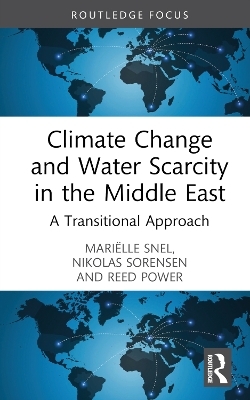
Climate Change and Water Scarcity in the Middle East
Routledge (Verlag)
978-1-032-56670-2 (ISBN)
As water's significance as a geopolitical resource is poised to surpass that of oil, this book explores the adaptation of Water, Sanitation, and Hygiene (WASH) services in the Middle East to climate change challenges, leveraging the Humanitarian-Development-Peace nexus for a sustainable transition and resilient solutions. Delving into the humanitarian and development sectors across the region, the authors advocate for a transformative approach towards more innovative, integrated, and localized programming. It draws a parallel between the increasing global shift in humanitarian needs, as starkly revealed by the COVID-19 pandemic, and the ongoing devastation wrought by climate change, particularly through water-related crises such as flooding, drought, famine, and conflict.
The authors stress the urgent need for adaptive and sustainable strategies that can swiftly respond to evolving climate challenges. This book argues that there is currently a window of opportunity for WASH practitioners to develop broader, multi-sectoral experiences to meet these challenges. Drawing on discussions with humanitarian and development practitioners and new contemporary case studies, this book analyzes the financial, institutional, environmental, technical, and socio-cultural considerations for creating sustainable WASH services in transition. The narrative emphasizes the urgent need for a Humanitarian-Development-Peace nexus approach, advocating for multisectoral collaboration and localization as vital to addressing protracted crises and climate change's escalating threats. It calls for a strategic shift towards organizations that merge immediate humanitarian aid with sustainable development, enhancing local capacities for effective, enduring solutions. The authors conclude by outlining practical actions for humanitarian and development organizations at the local, national, regional, and global levels to support effective integrated and transitional WASH programming in the future.
Mariëlle Snel is a senior global humanitarian WASH advisor for Save the Children International at the regional Middle East/Eastern Europe office based in Amman, Jordan. She has over 25 years of WASH experience in designing, implementing, researching, and publishing around contemporary issues including the humanitarian-development-peace WASH nexus, conflict, COVID, and climate change over the humanitarian, transitional, and development divide. Nikolas Sorensen is a humanitarian and development practitioner and researcher who has consulted with organizations like Save the Children US and Plan International. He has previously published works on the humanitarian-development-peace WASH nexus, specifically looking at the challenges of climate change, COVID-19, and conflict. Reed Power is a humanitarian and development practitioner, most recently working as a senior program officer at World Vision International, based in Iraq. His experience has included a strong focus on WASH linked to climate change and the humanitarian-development-peace WASH nexus.
1. Climate Change in the Middle East 2. Impact of Climate Change in the Middle East 3. Resilience Building and Institutional Concerns 4. Transitional WASH across the Nexus 5. Resilience, Sustainability, and the HDP Nexus Annex 1: Glossary Annex 2: List of Interviewee Respondents Annex 3: Implementation of Sustainable Groundwater Management in the Humanitarian Response in Yemen Annex 4: Greening in Schools and Health Care Facilities in Iraq Annex 5: BluElephant – Wastewater Treatment System in Palestine
| Erscheinungsdatum | 10.07.2024 |
|---|---|
| Reihe/Serie | Earthscan Studies in Water Resource Management |
| Verlagsort | London |
| Sprache | englisch |
| Maße | 138 x 216 mm |
| Gewicht | 420 g |
| Themenwelt | Sozialwissenschaften ► Soziologie ► Spezielle Soziologien |
| ISBN-10 | 1-032-56670-1 / 1032566701 |
| ISBN-13 | 978-1-032-56670-2 / 9781032566702 |
| Zustand | Neuware |
| Haben Sie eine Frage zum Produkt? |
aus dem Bereich


